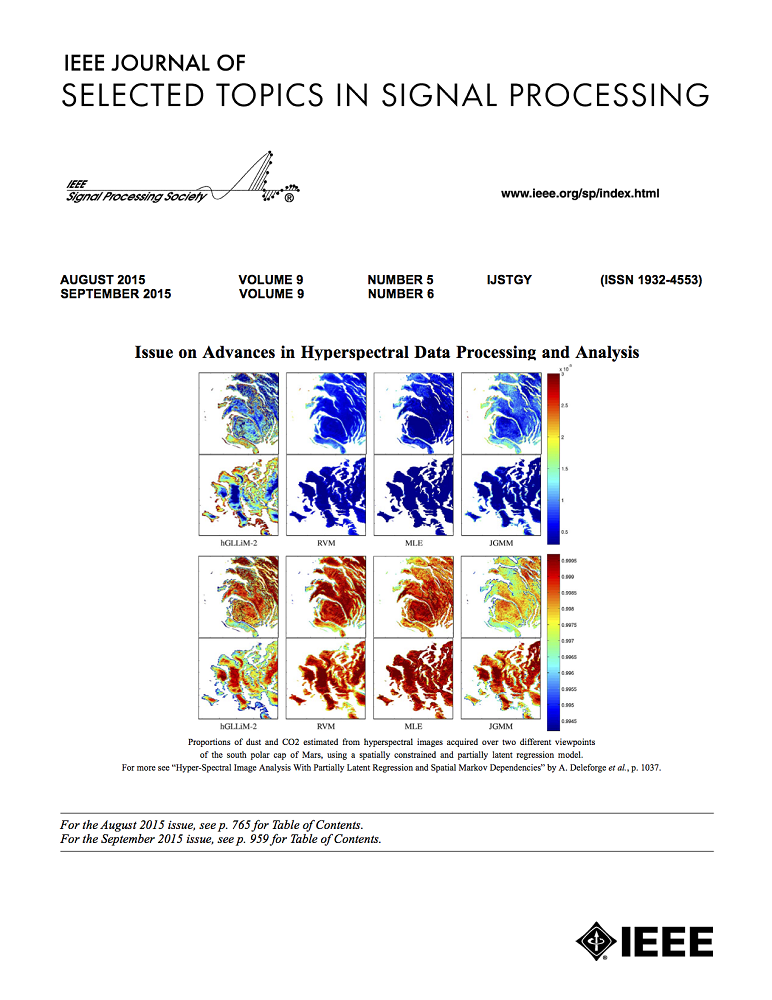Low-Rank Matrix Sensing-Based Channel Estimation for mmWave and THz Hybrid MIMO Systems
IF 8.7
1区 工程技术
Q1 ENGINEERING, ELECTRICAL & ELECTRONIC
IEEE Journal of Selected Topics in Signal Processing
Pub Date : 2023-06-22
DOI:10.1109/JSTSP.2023.3288703
引用次数: 0
Abstract
This article studies the channel estimation for wideband multiple-input multiple-output (MIMO) systems equipped with hybrid analog/digital transceivers operating in the millimeter-wave (mmWave) or terahertz (THz) bands. By exploiting the low-rank property of the concatenated channel matrix of the delay taps, we formulate the channel estimation problem as a low-rank matrix sensing (LRMS) problem and solve it using a low-complexity generalized conditional gradient-alternating minimization (GCG-ALTMIN) algorithm. This LRMS-based solution can accommodate different precoder/combiner and training structures. In addition, it does not require knowledge about the array responses at the transceivers, in contrast to most existing solutions allowing low training overhead. Furthermore, a preconditioned conjugate gradient (PCG) algorithm-based implementation and a low-rank matrix completion (LRMC) formulation are proposed to further reduce the computational complexity. In order to enhance the channel estimation performance for fat and tall channel matrices, we introduce a matrix reshaping approach that can preserve the channel rank by exploiting the shift-invariance property of uniform arrays. We also introduce a spectrum denoising (SD) approach for further improving the performance when the array responses are known and the number of paths is small. These approaches can effectively enhance the performance at a given training overhead. Simulation results suggest that the proposed solutions can achieve higher channel estimation accuracy and reduce the computational complexity as compared to several representative channel estimation schemes.毫米波和太赫兹混合MIMO系统中基于低秩矩阵感知的信道估计
本文研究了配备在毫米波(mmWave)或太赫兹(THz)波段工作的混合模拟/数字收发器的宽带多输入多输出(MIMO)系统的信道估计。通过利用延迟抽头的级联信道矩阵的低秩特性,我们将信道估计问题公式化为低秩矩阵感知(LRMS)问题,并使用低复杂度的广义条件梯度交替最小化(GCG-ALTMIN)算法进行求解。这种基于LRMS的解决方案可以适应不同的预编码器/组合器和训练结构。此外,与允许低训练开销的大多数现有解决方案相比,它不需要关于收发器处的阵列响应的知识。此外,为了进一步降低计算复杂度,提出了一种基于预条件共轭梯度(PCG)算法的实现和低秩矩阵完备(LRMC)公式。为了提高胖信道矩阵和高信道矩阵的信道估计性能,我们引入了一种矩阵整形方法,该方法可以利用均匀阵列的移位不变性来保持信道秩。我们还介绍了一种频谱去噪(SD)方法,用于在阵列响应已知且路径数量较少时进一步提高性能。这些方法可以在给定的训练开销下有效地提高性能。仿真结果表明,与几种具有代表性的信道估计方案相比,所提出的解决方案可以实现更高的信道估计精度并降低计算复杂度。
本文章由计算机程序翻译,如有差异,请以英文原文为准。
求助全文
约1分钟内获得全文
求助全文
来源期刊

IEEE Journal of Selected Topics in Signal Processing
工程技术-工程:电子与电气
CiteScore
19.00
自引率
1.30%
发文量
135
审稿时长
3 months
期刊介绍:
The IEEE Journal of Selected Topics in Signal Processing (JSTSP) focuses on the Field of Interest of the IEEE Signal Processing Society, which encompasses the theory and application of various signal processing techniques. These techniques include filtering, coding, transmitting, estimating, detecting, analyzing, recognizing, synthesizing, recording, and reproducing signals using digital or analog devices. The term "signal" covers a wide range of data types, including audio, video, speech, image, communication, geophysical, sonar, radar, medical, musical, and others.
The journal format allows for in-depth exploration of signal processing topics, enabling the Society to cover both established and emerging areas. This includes interdisciplinary fields such as biomedical engineering and language processing, as well as areas not traditionally associated with engineering.
 求助内容:
求助内容: 应助结果提醒方式:
应助结果提醒方式:


